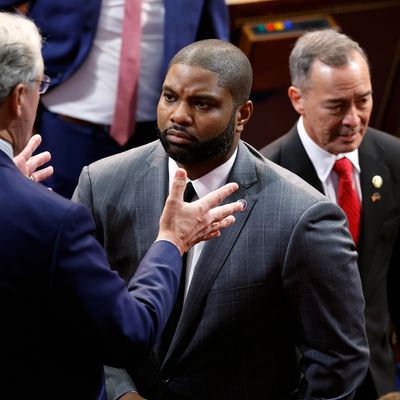
It’s anyone’s guess how Kevin McCarthy’s calamitous bid to become Speaker of the House will get resolved. After an unprecedented 12 rounds of voting, the California representative looks, for the first time, noticeably closer to his goal than when ballots opened on January 3. For most of the past week, 20 of his fellow House Republicans refused to support him and were hell-bent on either milking him for concessions — plum committee assignments, the ability to call a vote to oust him whenever they wanted — or thwarting his ambitions until he gave up. “You can’t make this crap up,” Slate reporter Jim Newell overheard on Thursday from representative-elect George Santos, who makes things up so often that you almost had to believe him.
Of all of the obstructionist tactics that McCarthy’s antagonists used, the most illuminating was their nomination of alternative candidates. With each successive round of voting, we saw the introduction of a name that fell into one of three overlapping categories: people who weren’t actually in Congress, members of Congress who didn’t want the job, or one of the House GOP’s four Black members. (The only clear rule was that none were McCarthy.) The point of the last category seemed mostly to give Republicans a chance to grandstand about race. “Yesterday, we could have elected the first Black Speaker of the House of Representatives,” North Carolina’s Dan Bishop lamented on Thursday after renominating Florida’s Byron Donalds.
There was no actual interest in having Donalds lead, of course. (“Donald John Trump!” shouted Matt Gaetz, switching his vote to the former president after being given the chance to back Donalds for a second time.) The Black Floridian embraced his moment in the spotlight regardless. After Democrat Cori Bush tweeted that Donalds was a “prop” being used to uphold white supremacy, he retorted, “If you see a Black man rising, I mean, let the man rise — even if you don’t agree with him.” McCarthy’s ordeal was a chaotic spectacle that laid bare how fractious the new House Republican majority is after a disappointing performance in the midterms. But it showed that, for all that is novel and unpredictable about the GOP’s predicament, it still has time to play its greatest hits.
And few are more reliable than racial cynicism. Republicans whiffed in the November elections, failing to win a Senate majority and clawing their way to just a five-vote advantage in the House despite a favorable electoral landscape. Their failure has been attributed to the party’s extremism on issues like abortion and the fielding of weak candidates. But they didn’t offer much of a platform either, defaulting instead to the kind of demagoguery that Trump deployed in his “American carnage” speech. With an assist from Fox News, which translated the party’s messaging into a persistent background thrum, Republicans seized on recent spikes in crime to paint a picture of a U.S. under siege. Their effort to blame it on Democrats found success in New York, where Republicans overperformed, but didn’t resonate in the swing states they actually needed to win — like Arizona, Georgia, and Pennsylvania.
The racial subtext of this decision was as unmistakable in 2022 as it was when Trump cited the same kind of malfeasance — vice in cities with large Black populations — to explain his election loss in 2020. Before helping Trump become president, racist demagoguery around crime has been an electoral gold mine dating back at least to the 1960s. It was reasonable to assume that hordes of Black and brown criminals would continue to be a galvanizing mental image. But this time, it felt almost perfunctory — like the reflex of a party that had run out of ideas.
If he hadn’t entered conservative politics, Donalds might still be the kind of Black man whose past indiscretions — he was arrested on a marijuana charge in the 1990s and later pleaded guilty to felony bribery — get regularly cited by Republicans to justify perpetual punishment and brutal law enforcement. The key difference is that Donalds has become a vessel for his party’s indignant posturing. “If he were a prop, he wouldn’t be sitting where he’s sitting!” crowed Bishop last week, lambasting what he termed Bush’s “tired, old, grotesquely racist rhetoric” toward Donalds. (Bush responded from the audience with an amused chuckle.) To Lauren Boebert, Donalds was a “friend” and “amazing man,” whose nomination for Speaker she reversed as soon as McCarthy’s opponents needed a new name to troll him with.
To Donalds himself, the Bush dustup meant airtime — a chance to complain about her on the Fox Business channel, where, of course, all intraracial disputes about Black solidarity get handled. “I would’ve never done that to her; it’s a shame that she did it to me,” the representative said ruefully. “It was an insult,” agreed the show’s 74-year-old white host, Stu Varney.
All of this is consistent with the Republican Party’s habit of activating its sparse bench of Black allies to deflect charges of racism — a form of tokenization that conveniently neglects the question of whether Black interests are actually being represented. For all of his faults, Hakeem Jeffries, the Black Democratic leader for whom all 212 House Democrats have voted to become Speaker, did not run on the pretense of stopping mythic mass-scale Black corruption while disenfranchising millions of real-life Black people. Donalds is only in the news, meanwhile, because McCarthy is practically dying of thirst — so desperate to become Speaker that no humiliation is too deep. And like the rest of us, he has now endured the laughable fiction that his opponents were serious about electing Donalds instead.






























